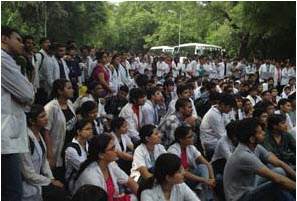NOTIFICATION
POST GRADUATE MEDICAL DEGREE / DIPLOMA COURSES, KERALA - 2013
LAST ROUND OF COUNSELLING TO FILL UP THE LEFT OVER STATE QUOTA
AND SURRENDERED ALL INDIA QUOTA SEATS
The last and final round of counseling to fill up the vacant Government Quota seats,
State Quota seats which became vacant consequent to the fourth round of All India
Counselling and Surrendered All India Quota seats in P G Medical courses - 2013 under
Government/Self Financing colleges will be conducted on 29.08.2013 (Thursday) at
Dr. C O Karunakaran Memorial auditorium near Regional Cancer Centre, Medical College
campus, Thiruvananthapuram. The counseling will be manual and subject to the conditions
and stipulations specified in G.O.(Rt) No. 3006/2013/H&FWD dated 26.08.2013. The
counseling to the General Quota seats will be based on the various merit and category lists
published by the Commissioner for Entrance Examinations and that to the Service Quota
seats will be based on the seniority-wise lists of service candidates prepared by the Heads
of Departments concerned. The allotment to the Health Service Quota seats will be as per
the modified seniority-wise list prepared by the Director of Health Services in accordance
with the verdict of the Hon’ble High Court of Kerala dated. 30.07.2013 in WP(C)
No.13330/2013 and connected cases.
The service candidates and SC/ST candidates are directed to report to the venue of
the personal counseling at 9.30 am on 29.08.2013. The General Quota candidates are
directed to report to the venue of the personal counseling at 11.30 am on 29.08.2013.
The candidates who have already taken admission under All India Quota and holding
All India Quota seat at present are not allowed to attend the counseling.
The candidates coming from the Self Financing Medical Colleges to attend the
counseling shall produce all their original certificates, NOC and necessary affidavits stating
that the Self financing Medical College Management is willing to admit candidates allotted
by the CEE from the Government Merit list in the resultant vacancies.
The candidates who are allotted a subject in the counseling and do not join the
course on any reason shall be liable to pay the liquidated damages as per the conditions in
the prospectus.
No candidates who have already admitted in Government Medical Colleges are
allowed to move to another Government Medical College in the same subject
No transfer from one Self Financing Medical College to another shall be allowed.
The vacancies created at the time of allotment will be filled up then and there itself
according to merit and eligibility.
The candidates who get allotment will be issued with an allotment memo and the
fee to be paid will be shown in the memo. This amount of fee should be paid in the college
concerned.
All details related to the allotment process are available on the website
www.cee.kerala.gov.in.
Help Line Numbers: 0471 2339101, 2339102, 2339103, and 2339104






















